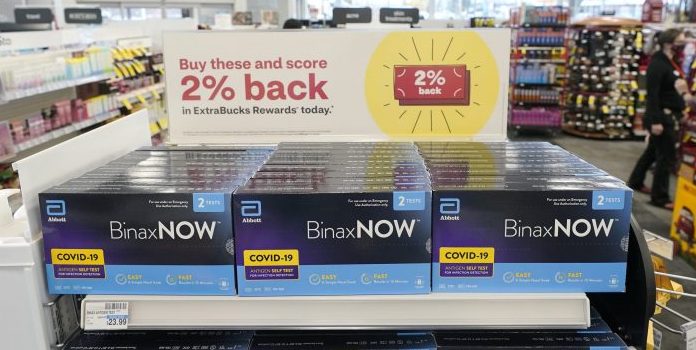(Headline USA) The Biden administration’s plan for health insurers to reimburse consumers for over-the-counter COVID-19 tests echoes a bygone era when the companies processed large volumes of claims from individuals—with paper receipts.
It’s unclear if the buy-first, get-paid-later approach will spur people to go out and get the tests, even with new urgency around the highly transmissible but relatively mild omicron variant.
“It’s not likely to yield the same level of accessibility that people in other countries have,” said Cynthia Cox of the nonpartisan Kaiser Family Foundation. Cox, who tracks the U.S. health system in comparison to other advanced countries, points out that consumers in the United Kingdom can pick up free rapid tests at the pharmacy or have them delivered to their homes.
“I think we are still going to have testing problems next year,” added Cox. “People will still have problems accessing affordable tests in a timely manner.”
Omicron is not the only reason testing is taking on renewed importance. Anticipated approval of antiviral pills that COVID-19 patients can take at home is also expected to increase demand for fast tests that can provide reliable results.
Officials have yet to provide operational details of the Biden plan, with formal guidance due Jan. 15. But the administration is confident it can overcome problems that have bedeviled U.S. testing from the start of the coronavirus pandemic.
According to a White House fact sheet, health insurance companies will become the cornerstone of testing for more than 150 million people with private coverage. Insurers would reimburse for rapid tests that deliver results in as little as 15 minutes. Although available over the counter, they can be hard to find.
Coronavirus response coordinator Jeff Zients says the administration has quadrupled the supply of at-home tests, while creating a streamlined process to get new options to market. The government is scaling up free testing at pharmacies and community venues as well.
“Our goal is to give free tests to everyone who wants one in the most efficient and effective way possible,” Zients said recently. “There is enough testing capacity in this country, and we’re confident that as more tests come to market … innovation will continue and prices will come down.”
Estimated prices for at-homes tests in the U.S. now range from about $15 to $30, compared with about $1 in Germany.
Without voicing outright opposition, health insurance companies have been cool to the idea. The largest trade group, America’s Health Insurance Plans, has expressed concerns about price gouging for over-the-counter tests and higher premiums for consumers. The Blue Cross Blue Shield Association has called for “commonsense implementation.”
There’s a sense that the industry is being handed a new kind of mission.
Health insurance normally covers medically necessary services and procedures, but would COVID-19 testing for a long-desired family reunion meet that threshold?
And with the automation of insurance billing, companies say they’ll have to bring on new staff to handle the volume of claims for over-the-counter COVID-19 tests even if consumers upload their paper receipts.
The White House hasn’t said how insurers are supposed to cover the cost.
Health and Human Services Secretary Xavier Becerra says it’s in the self-interest of insurers to try to keep their plan members healthy. “We are going to make sure that the American people have access to tests and they don’t have to pay out of pocket,” said Becerra. “We’re hoping that it will be done in a way that is a smooth as possible, and everyone understands that it’s in their best interest.”
Some public health experts are concerned the administration may be off course.
“If what we get is that everybody has to buy tests and submit paperwork for reimbursement and then get a refund, that is going to result in many people not getting tested because there are too many barriers in the way,” said Dr. Leana Wen, a former Baltimore health commissioner and commentator on the pandemic.
She would like every household to get a packet of rapid tests sufficient to test all members twice a week.
While the highly contagious omicron variant has got the world’s attention right now, there’s an entirely different reason emerging for the U.S. to ramp up rapid testing.
Federal health regulators are expected to soon authorize two promising antiviral pills for COVID-19, the first that patients could take at home to head off the worst consequences of the disease. Current treatments require an infusion or injection at a hospital or clinic.
The new pills are most effective when given early — within three to five days of first symptoms. Patients will likely be required to provide a positive COVID-19 test before they can get a prescription. That narrow window is expected to generate even more demand for at-home tests.
Dr. Michael Mina, chief science officer for eMed, said the government has to step back and rethink its testing strategy. Mina recently left a teaching post at Harvard to join the company, which is vying to set the standard for verified at-home rapid COVID testing.
The Biden administration should open up the country to cheaper rapid tests from overseas, said Mina, set clear guidelines about what kinds of tests should be used under varying circumstances, and encourage the adoption of authentication systems for rapid tests.
“The decision to tell insurers to reimburse all tests, I think, doesn’t make sense,” said Mina, arguing that COVID testing is primarily a public health tool.
“The insurance companies should be asked to pay when testing is used for a medical reason, but everybody should get allocated a certain amount of tests from the government,” he said. “If we don’t have a testing strategy, then we literally don’t see the virus when it spreads.”
Adapted from reporting by the Associated Press

